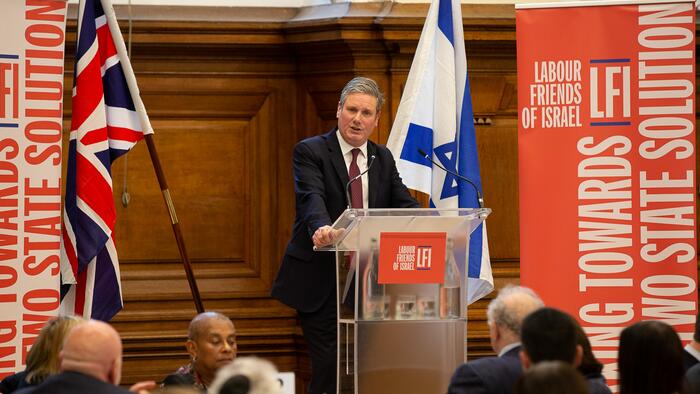


The US has warned Britain and France against recognizing a Palestinian state at a UN conference later this month, Middle East Eye can reveal.
France and Saudi Arabia are set to co-host a major UN conference on the two-state solution beginning on June 17 in New York. France is reportedly gearing up to unilaterally recognize a Palestinian state at the conference. MEE understands that France has been lobbying Britain to do so as well.
French officials believe the British government is onboard with the plan, according to French media. But Washington privately begun to warn Britain and France against unilaterally recognizing Palestine, sources with knowledge of the matter in the British Foreign Office told MEE.
At the same time Arab states are urging them to proceed with the move, sources said. In late May, UN member states held consultations in preparation for the conference during which the Arab Group urged states to recognize Palestinian statehood.
The Arab Group said they would measure the success of the conference by whether significant states recognize Palestine, Foreign Office sources added.
'No grounds for US interference'
Approached for comment, the Foreign Office pointed MEE to Foreign Secretary David Lammy’s statement on May 20 in which he reaffirmed UK support for a two-state solution.
Lammy has publicly opposed unilateral recognition, insisting earlier this year that the UK would only recognize a Palestinian state "when we know it’s going to happen and it’s in sight."
But in late April, Lammy acknowledged for the first time that Britain was in discussion with France and Saudi Arabia on the topic.
Chris Doyle, director of the Council for Arab-British Understanding, told MEE: "There are no legitimate grounds for the US to interfere in a sovereign decision by Britain and France to recognize another state."
"A Franco-British recognition would be to acknowledge the Palestinian right to nationhood and to be equal partners in any future negotiations with Israel." Doyle added: "Based on precedent with this British government, US objection to recognition would be more likely to have an impact on Britain than on France."
But the American president is unpredictable. "What really counts is what President Trump himself thinks," Doyle said. "Opposing unilateral recognition is an existing American position."
"But if I was in Downing Street, I would be asking what does the president himself believe - and how will he react?" If France and Britain go ahead with the move, they will become the first G7 nations to recognize a Palestinian state.
Alon Pinkas, who advised four Israeli foreign ministers, told MEE on Monday that French President Emmanuel Macron’s push to recognize Palestinian statehood "is serious and has the backing of most of the European Union and Saudi Arabia."
The move would cause a political earthquake, since both France and Britain are among Israel's most important historic allies. And Israel has signaled it would not take the move lying down.
Last week Ron Dermer, Israel's strategic affairs minister, threatened Britain and France that Israel may annex parts of the West Bank if they recognize a Palestinian state, according to Israeli newspaper Haaretz.
MEE revealed earlier this month that Britain privately decided in 2014 it would consider recognizing a Palestinian state if Israel advanced with the contentious E1 settlement project. Israel is currently poised to move forward with the settlement plan, which would effectively split the occupied West Bank in two.
Meanwhile, domestic pressure is ramping up in Britain. "Starmer is facing significant levels of anger throughout the entirety of the Labour party and the British public," Doyle said, "even in circles that would ordinarily support the Israeli government."
Several MPs told MEE last month they believe the UK must recognize a Palestinian state immediately. Labour MP Uma Kumaran, a member of Britain's Foreign Affairs Select Committee, said: "This government was elected on a manifesto that promised to recognize Palestine as a step towards a just and lasting peace. "I strongly support the recognition of a Palestinian state, and I have raised this repeatedly in parliament, on the Foreign Affairs Committee and with ministers."
